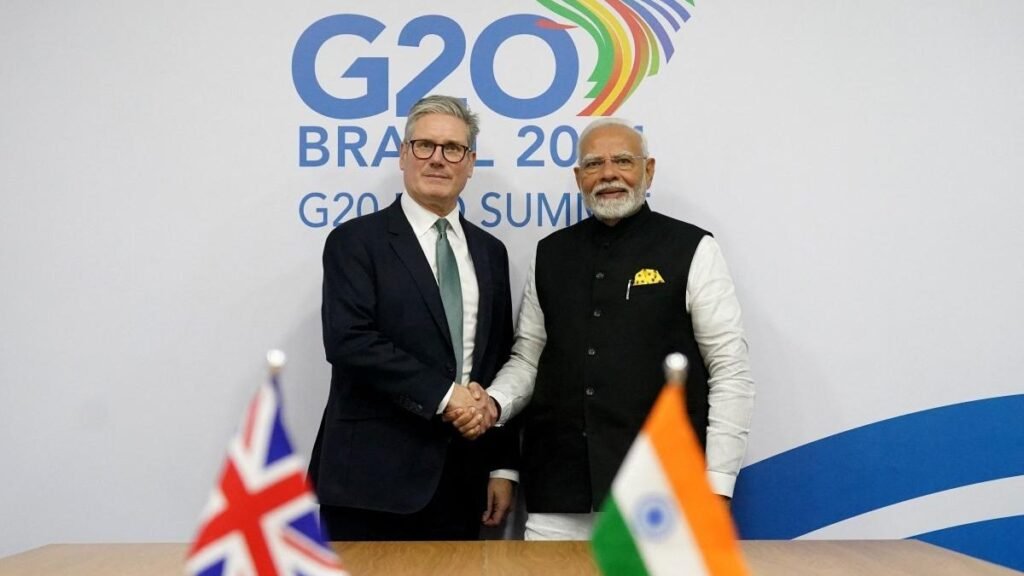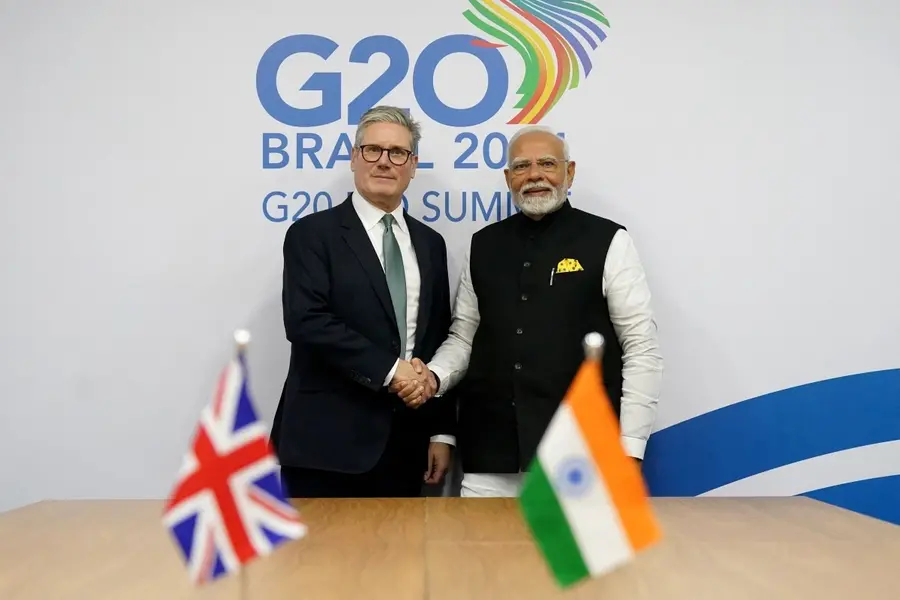UK-India Free Trade Agreement to slash tariffs, boost trade, and create jobs. Expected to add billions to UK GDP and strengthen bilateral ties.
Chequers: British Prime Minister Keir Starmer has described the Free Trade Agreement (FTA) with India as a “landmark” deal that will deliver substantial economic benefits. Speaking ahead of bilateral talks with Indian Prime Minister Narendra Modi at Chequers, Starmer said the agreement represents a “major win” for jobs, trade, and the wider British economy.
The FTA is expected to slash tariffs on a range of goods, improve market access for UK businesses, and attract nearly GBP 6 billion in new investment and export opportunities. Key sectors including manufacturing, financial services, clean energy, and food and drink are set to benefit significantly.
Key features of the UK-India FTA:
Tariff Reductions: Average Indian tariffs on UK goods will fall from 15% to 3%. Major cuts include:
Whisky: Tariffs will be reduced from 150% to 75% immediately, and down to 40% over the next decade.
Automotives: Reduced from 110% to 10% under a quota.
Aerospace and electrical machinery: Tariffs cut from 11% and 22% respectively, down to 0%.
Market Access: UK exporters of soft drinks, cosmetics, cars, and medical devices will find it easier to enter the Indian market with fewer regulatory barriers.
Economic Impact: The agreement is forecast to boost the UK’s GDP by GBP 4.8 billion annually in the long term and increase bilateral trade by 39%, or GBP 25.5 billion, compared to projections without the deal.
Clean Energy & Services: UK clean energy firms will gain unprecedented access to India’s vast green energy procurement market. Financial and professional services will benefit from improved investment rules, including the binding of India’s foreign investment cap for the insurance sector.
Prime Minister Starmer emphasised the deal’s importance in delivering on his government’s economic priorities.
“Our landmark trade deal with India is a major win for Britain…It will create thousands of British jobs across the UK, unlock new opportunities for businesses and drive growth in every corner of the country—delivering on our Plan for Change.”
He also highlighted the cost-of-living benefits for consumers.
“We’re putting more money in the pockets of hardworking Brits and helping families with the cost of living, and we’re determined to go further and faster to grow the economy and raise living standards across the UK.”
Investment and Jobs
The UK Department for Business and Trade (DBT) confirmed that nearly £6 billion in new investment and export wins have already been secured alongside the deal. Indian companies are expanding operations in the UK, while 26 British firms, including aerospace giants Airbus and Rolls-Royce, have clinched new contracts in India. Airbus aircraft powered by Rolls-Royce engines are set to begin deliveries soon.
Business and Trade Secretary Jonathan Reynolds added, “The billions brought to our economy from the trade deal signed today will reach all regions and nations of the UK so working people in every community can feel the benefits.”
Strengthening strategic ties
Alongside the trade pact, both countries will renew their Comprehensive and Strategic Partnership, deepening cooperation in defence, education, climate, technology and innovation.
During the talks, both nations will also agree to strengthen cooperation in tackling corruption, serious fraud, organised crime and irregular migration through enhanced intelligence sharing and operational collaboration.
With PTI inputs
Subscribe to our Newsletter
Disclaimer: Kindly avoid objectionable, derogatory, unlawful and lewd comments, while responding to reports. Such comments are punishable under cyber laws. Please keep away from personal attacks. The opinions expressed here are the personal opinions of readers and not that of Mathrubhumi.


